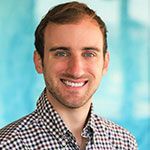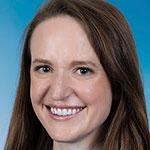 As a resident, Michael Puente Jr., MD, embarked on his advocacy journey with a project highlighting discriminatory practices preventing gay men from donating their corneas.
As a resident, Michael Puente Jr., MD, embarked on his advocacy journey with a project highlighting discriminatory practices preventing gay men from donating their corneas.
See a slide show of Dr. Puente advocating on Capitol Hill.
Between 1,600 to 3,200 cornea donations a year are turned away due to bans on corneal donation by gay and bisexual men in the United States and Canada, according to a study Dr. Puente later published. Since then, Dr. Puente, a pediatric ophthalmologist at the University of Colorado, has advocated for Food and Drug Administration (FDA) policy changes that would ease restrictions on cornea donations from gay men.
Dr. Puente is a co-founder of the Academy’s LGBTQ+ Community, president of the Colorado Society of Eye Physicians and Surgeons, and also chairs the American Association for Pediatric Ophthalmology and Strabismus (AAPOS) Advocacy Committee.
I recently sat down with Dr. Puente to discuss advocacy as a young ophthalmologist and how to get involved. I hope you enjoy our conversation as much as I did.
Dr. Smith: Can you tell us some of the challenges you faced during your corneal donation project, and how you overcame them?
Dr. Puente: One of the biggest challenges was imposter syndrome, as I felt like advocacy was something only a senior, more established ophthalmologist can do. As a resident or young ophthalmologist, I felt like I wasn’t worthy or wasn’t ready. But it occurred to me that advocacy often needs a young ophthalmologist’s perspective because we look at things a little differently, with fresh eyes, and can often bring a new perspective that helps change things for the better.
Dr. Smith: What are some of the things you wish you had known sooner about advocacy?
Dr. Puente: I wish I had gotten involved earlier. I didn’t realize how easy it is or how broad it is. As doctors we are trained to make diagnoses, develop treatment plans, and perform surgery. But that’s only a small part of health care in this country. There are so many rules and policies that are set by politicians who know absolutely nothing about ophthalmology or healthcare in general or by administrators who are setting the rules that we then have to practice by. If something could be better, we should speak up. And I wish I knew I had that power at an earlier age or earlier in my training.
Dr. Smith: How important is state society involvement for young ophthalmologists?
Dr. Puente: It’s really important. So many things that affect our practice come out of our state legislatures, and we must have a voice there, particularly in eye care. We want to be there routinely, not just during a scope battle, advocating for policies and being a resource for eye care or medicine in general.
Dr. Smith: What role did mentorship play in your advocacy journey?
Dr. Puente: When I was first starting this project, I had never been involved in advocacy before, and did not have much research experience or experience with organized medicine. Some of my mentors here at the University of Colorado connected me with people from the Academy and the Colorado Society of Eye Physicians and Surgeons who believed in me and saw potential in me and were able to connect me with people who were able to bring my ideas to fruition and guide me in the process. I certainly wouldn’t have been able to get so far in this project without mentors who believed in me and helped show me the way.
Dr. Smith: With your busy schedule, how do you find time for advocacy?
Dr. Puente: It’s something that brings me joy and professional satisfaction. We all went into medicine wanting to help patients, and this is a way that you can help a whole lot of patients all at once and have a much bigger impact. There are so many things that we can advocate about. Legislators and policymakers often really want to hear from us and make positive changes. If you bring them a good idea, something that they can help with, they are often really eager to do so.
Dr. Smith: What advice do you have for young ophthalmologists who are interested in getting involved with advocacy, but don’t know where to start?
Dr. Puente: I would say find mentors who are involved in advocacy. There are people involved in advocacy in every state through the state societies or academic centers. Find those people and talk to them, there are often opportunities. For a resident, a great opportunity is going to Mid-Year Forum, and most state societies sponsor a resident to go through the Advocacy Ambassador Program. It’s an easy way to meet other people interested in advocacy and get your feet wet.
Dr. Smith: Do you have any other piece of advice or things you would like to tell young ophthalmologists about advocacy?
Dr. Puente: I would say that advocacy issues are everywhere. If you are in a clinic or an ER or in surgery and something seems like it could be done better, it probably could be. You can, and should, advocate for a system change. Because if you don’t, maybe no one else will.
Further Resources
To learn more about Dr. Puente’s corneal donation advocacy project, visit legalizegayeyes.org.
 |
About the author: Casey G. Smith, MD, is a pediatric ophthalmologist at the University of Colorado in Denver. She chairs the AAPOS Professional Education Committee and is a member of the AAPOS Advocacy Committee. She joined the YO Advocacy Subcommittee in 2022. Dr. Puente is a pediatric ophthalmologist at the University of Colorado, where he serves as an assistant professor of ophthalmology and director of Medical Student Education in Ophthalmology. |
Michael Puente Jr., MD, and Advocacy